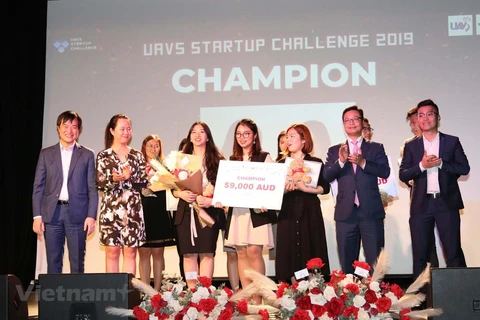Hanoi (VNA) - The presence of international investors for start-ups and innovation is increasing, and successful first-generation start-ups also want to invest for their next-generation fellows.
 Seminar “New business models and start-ups in Vietnam – bottlenecks and recommendations” (Photo: VietnamPlus)
Seminar “New business models and start-ups in Vietnam – bottlenecks and recommendations” (Photo: VietnamPlus) Seminar “New business models and start-ups in Vietnam – bottlenecks and recommendations” (Photo: VietnamPlus)
“The number and quality of investments in start-ups tended to rise sharply in 2018, with a total capital of approximately 889 million USD, a three-fold increase compared to 2017.”
The above information was shared by Associate Professor, Dr. Nguyen Hong Son, deputy head of the Party Central Committee’s Economic Commission at the seminar "New business models and startups in Vietnam - bottlenecks and recommendations" within the framework of the Vietnam Private Sector Economic Forum 2019 on May 2.
According to Son, the presence of international investors for startups and innovation is growing. Notably, the number and activities of angel investors tend to go up, evidenced by the fact that successful first-generation start-ups want to invest in those in the next generation.
Specifically, activities of angel investors in Vietnam started to become more systematic via several connectivity activities, and the establishment of clubs and investment networks for start-ups like VIC Impact, iAngel, Angel4us, among others.
The potential of the Vietnamese people has been "awakened" with initial successes, which reflects the Party and State's sound guidelines and policies on promoting the strength of the private sector as well as the government's determination to build "e-government towards digital government and economy."
However, Son frankly pointed out that the environment for start-ups still faces difficulties arising from investment policies to issues related to divestment, lending and venture capital which create barriers that make investors more cautious and their opportunities be lost.
At the event, managers, economists and businesspeople discussed and gave recommendations to remove economic challenges facing the private economy, making it an important driving force of the whole economy, as well as seek measures to create breakthroughs for Vietnamese start-ups so that they could catch up with common trends of the region and the world.
They debated new business models that suit Vietnam, countries’ approach to new business models during the digital era, facilitation measures, and lastly the building of a capital market reserved for Vietnam’s start-ups and innovation.
Vietnam had 3,000 start-ups in 2019 to rank third in Southeast Asia, and the number continues to increase each year,
Vietnam’s high-tech companies are keeping abreast of the latest global industry 4.0 technology trends in areas like big data, artificial intelligence/machine learning, internet of things, blockchain, and digital transformation.
Moreover, the Government and the HCM City administration are also deploying projects to build smart cities around the country, promoting innovative start-up programmes, and implementing projects to transform HCM City into a regional and international financial hub.
Those favourable conditions are of great advantage to Vietnam, especially to enterprises who want to provide products and services based on new technologies, and provide a golden opportunity for its IT industry to break through and become the regions’ leading innovation hub.
According to a Nikkei Asian Review article, Vietnam's start-up sector is closing the gap with regional leaders Indonesia and Singapore with new investment.
The article cited a joint research by Ho Chi Minh City-based venture capital ESP Capital and Singapore's Cento Ventures which showed start-up investment in Vietnam hit 246 million USD this year through June on 56 deals.
It added that investment is expected to top 800 million USD by the end of the year, which would represent a rise of at least 80 percent over last year's 444 million USD.
The article said a total of about 5.9 billion USD was invested in Southeast Asian start-ups in the first half of 2019. When it comes to the investments that can be tracked to a destination country, Vietnam accounted for 17 percent of start-up investments in the region, up from 5 percent for all of 2018, following Indonesia at 48 percent and Singapore at 25 percent./.























